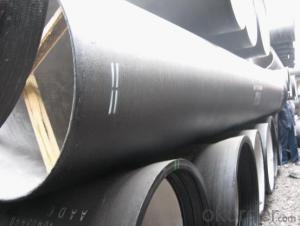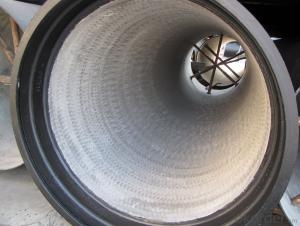Ductile Iron Pipe DN2000 K9
OKorder Service Pledge
Quality Product, Order Online Tracking, Timely Delivery
OKorder Financial Service
Credit Rating, Credit Services, Credit Purchasing
You Might Also Like
Specifications
Quick Details
| Place of Origin: | China (Mainland) | Brand Name: | CMAX | Model Number: | T type / K type / Flange type |
| Length: | 6m / 5.7m / Negotiable | Standard: | ISO2531 / EN545 / EN598 | Application: | Potable / Sewage water |
| Diameter: | DN80~DN2200 | Shape: | Round | Hardness: | 230 |
| Pipe Wall Thickness: | standard | Pull Strength: | 420 | Yield (≥ MPa): | 300 |
| Material: | Ductile Iron | Type: | Centrifugal ductile cast iron pipe | Certification: | ISO2531 / EN545 / EN598 |
| Outer Diameter: | 80-2200 | Thickness: | standard | Specification: | DN80~DN2200 |
| |
The advantages to the customer:
Trustworthy financial strength.
One-stop shopping.
Fast and efficient service.
Coordination of shipments from multiple plants.
Specialists of the overseas shipping process.
A more competitive price.
- Q:Are ductile iron pipes suitable for tunneling projects?
- Yes, ductile iron pipes are suitable for tunneling projects. They have high strength and flexibility, making them able to withstand the ground movement and settling that can occur during tunnel construction. Additionally, their corrosion resistance and longevity make them a reliable choice for underground applications.
- Q:Why is the cast iron tube lined with cement? Under what circumstances are ductile iron pipes lined with cement, and under what circumstances do not have to be lined with cement?
- The cement lining protects the water quality, reduces the head loss and improves the service life of the spheroidal graphite pipe. As long as the water delivery hose is used, the cement lining must be used. There is no lining cement for conveying air.
- Q:Can ductile iron pipes be used for water tunnel crossings?
- Yes, ductile iron pipes can be used for water tunnel crossings. Ductile iron is a strong and durable material that can withstand the pressure and load requirements of water tunnel crossings. Its corrosion resistance and flexibility make it suitable for underground installations, ensuring the safe and efficient transport of water.
- Q:Can ductile iron pipes be used for underground cooling water systems?
- Yes, ductile iron pipes can be used for underground cooling water systems. Ductile iron is known for its strength, durability, and corrosion resistance, making it suitable for various applications, including underground installations. It can withstand the pressure and temperature requirements of cooling water systems, providing a reliable and long-lasting solution.
- Q:What is the expected leakage rate for ductile iron pipes?
- The expected leakage rate for ductile iron pipes can vary depending on various factors such as the age, condition, and installation methods of the pipes, as well as the quality of the materials used. However, ductile iron pipes are generally known for their durability and low leakage rates compared to other pipe materials. According to industry standards and research studies, the expected leakage rate for well-maintained ductile iron pipes can be as low as 0.1% per year. This means that, on average, less than 1 liter of water per meter of pipe length may leak annually. However, it is important to note that this is an average figure and actual leakage rates can vary. Regular maintenance and inspections play a crucial role in minimizing leaks and ensuring the longevity of ductile iron pipes. Additionally, proper installation techniques, such as using effective jointing methods and adequate bedding and backfill materials, can also contribute to reducing leakage rates. It is recommended to consult with industry professionals and adhere to applicable standards and regulations to determine the expected leakage rate for specific ductile iron pipe installations.
- Q:What is the excavation width of ductile iron pipes with diameters greater than 1400?
- Because of differences in depth and soil properties, the excavation width is differentUsually to ensure that the width of bottom surface on both sides of the 600 1400+ manual operation. (such a large pipe flange bolt, the tool is not easy to expand, so the need for manual operation. So wide)
- Q:What are some common applications for ductile iron pipe?
- Ductile iron pipe, known as DI pipe, is extensively utilized in a variety of applications because of its durability, strength, and ability to resist corrosion. The following are some common uses of ductile iron pipe: 1. Water Distribution: DI pipe is widely employed in the distribution of clean water. Its high tensile strength enables it to withstand high water pressure, making it perfect for water mains, water transmission lines, and water distribution networks. 2. Sewer Systems: DI pipe is commonly utilized in sewer systems because of its corrosion resistance and ability to handle heavy loads. It is often used for gravity sewer lines, force mains, and stormwater systems. 3. Industrial Applications: DI pipe is used in various industrial settings, such as power plants, chemical plants, and refineries. It is utilized for the transportation of water, wastewater, and other fluids in these industries. 4. Irrigation Systems: Due to its strength and long lifespan, DI pipe is suitable for irrigation systems, particularly in agricultural areas. It is used to transport water for irrigation purposes, ensuring efficient water distribution in fields and farms. 5. Fire Protection Systems: DI pipe is commonly employed in fire protection systems, including fire hydrants, fire sprinkler systems, and fire suppression systems. Its robustness and ability to withstand high pressure make it an excellent choice for reliable and effective fire protection. 6. Pumping Stations: DI pipe is frequently utilized in pumping stations, which are crucial for various water-related applications. It is used in water intake systems, wastewater pumping stations, and water treatment plants to efficiently transport water and wastewater. 7. Municipal Infrastructure: DI pipe is widely used in municipal infrastructure projects, such as road drainage systems, culverts, and bridge crossings. Its strength, durability, and ability to withstand external loads make it suitable for these applications. 8. Gas Distribution: Although primarily used for water-related applications, DI pipe is also utilized for the distribution of natural gas and other gases. It is preferred for gas distribution due to its resistance to corrosion and ability to withstand high-pressure environments. In conclusion, ductile iron pipe has a wide range of applications and is preferred in situations that require strength, durability, and resistance to corrosion. Its versatility and reliability make it a popular choice for various infrastructure projects and industrial applications.
- Q:How do ductile iron pipes handle ground settlement near construction foundations?
- Ductile iron pipes are renowned for their effectiveness in handling ground settlement near construction foundations. Their flexible nature enables them to withstand ground movement without suffering severe damage or failure. When the ground settles near construction foundations, it exerts pressure on the surrounding infrastructure, potentially causing shifts in the soil. Ductile iron pipes have the advantage of absorbing and distributing this pressure, minimizing the risk of pipe breakage or deformation. A significant factor contributing to the resilience of ductile iron pipes is their high tensile strength. This strength enables the pipes to maintain their structural integrity even under substantial external forces. Consequently, they can endure ground settlement without experiencing fractures or cracks. Moreover, ductile iron pipes possess a high level of flexibility. This flexibility allows them to adapt to minor ground movements and accommodate shifts in the soil without compromising their functionality. The pipes can bend slightly without breaking or causing leaks, ensuring a continuous flow of fluids and preventing disruptions to the construction project. Additionally, ductile iron pipes are commonly installed with appropriate bedding and backfill materials. This ensures that the pipes have a stable and secure foundation, minimizing the risk of movement and settlement. The use of these materials also helps distribute the load exerted on the pipes more evenly, further enhancing their ability to handle ground settlement. All in all, ductile iron pipes are an excellent choice for construction projects that involve concerns about ground settlement. Their strength, flexibility, and proper installation techniques allow them to effectively handle ground movement near construction foundations, resulting in reliable and long-lasting infrastructure.
- Q:Can ductile iron pipes be used for cooling water systems?
- Yes, ductile iron pipes can be used for cooling water systems. Ductile iron pipes have excellent corrosion resistance and high-pressure capacity, making them suitable for conveying cooling water. Additionally, their strength and durability ensure long-term performance and stability in cooling water applications.
- Q:How do ductile iron pipes perform in earthquake-induced ground movements?
- Ductile iron pipes have proven to be a reliable and resilient choice for underground infrastructure, including in areas prone to earthquake-induced ground movements. The unique properties of ductile iron, such as its strength and flexibility, allow it to withstand the effects of ground movements during an earthquake. During an earthquake, the ground experiences shaking and shifting, which can exert significant forces on underground pipes. Ductile iron pipes have the ability to flex under these forces, absorbing the energy and reducing the risk of failure. They can withstand substantial ground movements without cracking or breaking, which ensures the continued flow of water or other fluids. In addition, ductile iron pipes have excellent resistance to corrosion and are highly durable, making them suitable for long-term use in earthquake-prone areas. This reduces the need for frequent maintenance or replacement, providing cost-effective and reliable infrastructure solutions. Furthermore, the joints used in ductile iron pipe installations are designed to accommodate movement and allow for slight adjustments during ground shifts. This flexibility prevents the pipes from becoming dislodged or separated, maintaining the integrity of the system. Overall, ductile iron pipes have a proven track record of performance in earthquake-induced ground movements. They offer resilience, flexibility, and durability, ensuring the continuous functioning of water and sewer systems even in areas prone to seismic activity.
1. Manufacturer Overview |
|
|---|---|
| Location | |
| Year Established | |
| Annual Output Value | |
| Main Markets | |
| Company Certifications | |
2. Manufacturer Certificates |
|
|---|---|
| a) Certification Name | |
| Range | |
| Reference | |
| Validity Period | |
3. Manufacturer Capability |
|
|---|---|
| a)Trade Capacity | |
| Nearest Port | |
| Export Percentage | |
| No.of Employees in Trade Department | |
| Language Spoken: | |
| b)Factory Information | |
| Factory Size: | |
| No. of Production Lines | |
| Contract Manufacturing | |
| Product Price Range | |
Send your message to us
Ductile Iron Pipe DN2000 K9
OKorder Service Pledge
Quality Product, Order Online Tracking, Timely Delivery
OKorder Financial Service
Credit Rating, Credit Services, Credit Purchasing
Similar products
New products
Hot products
Related keywords




























